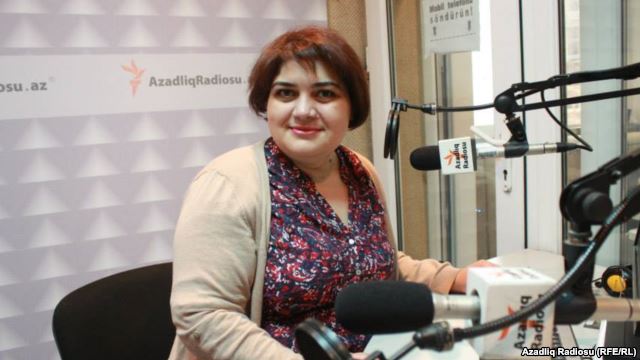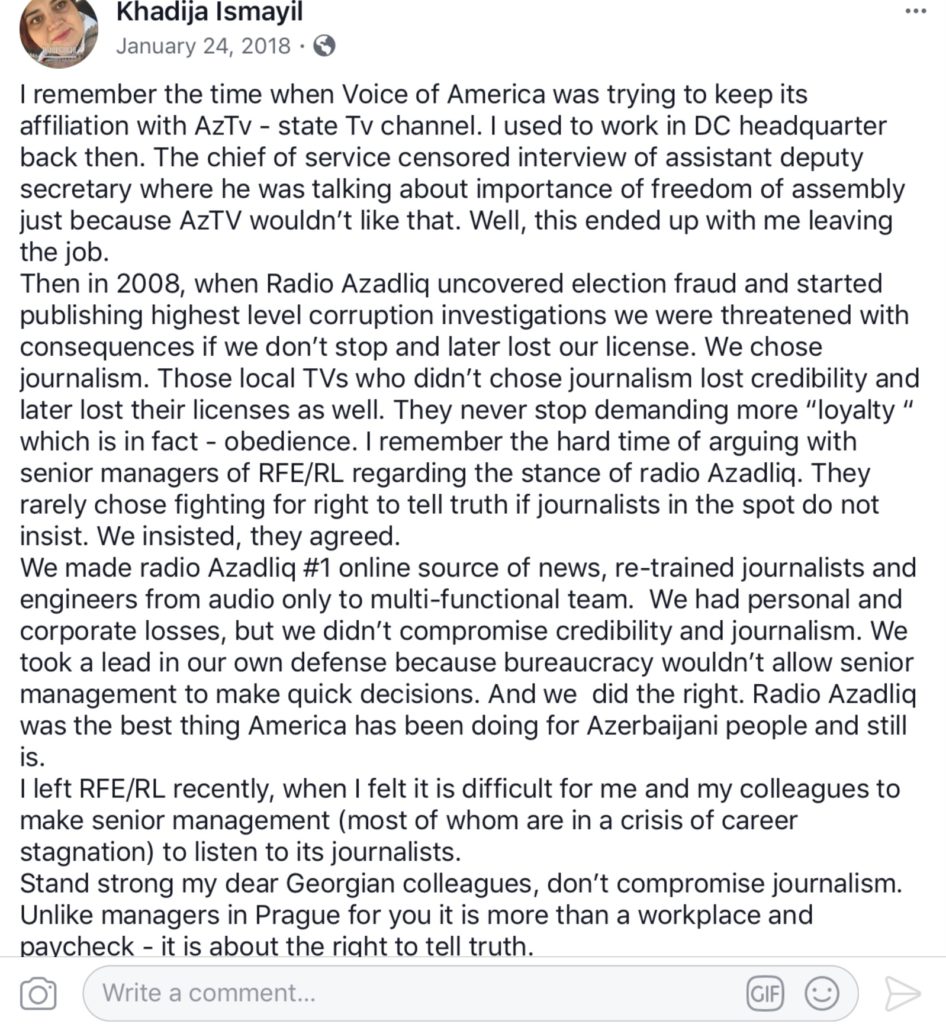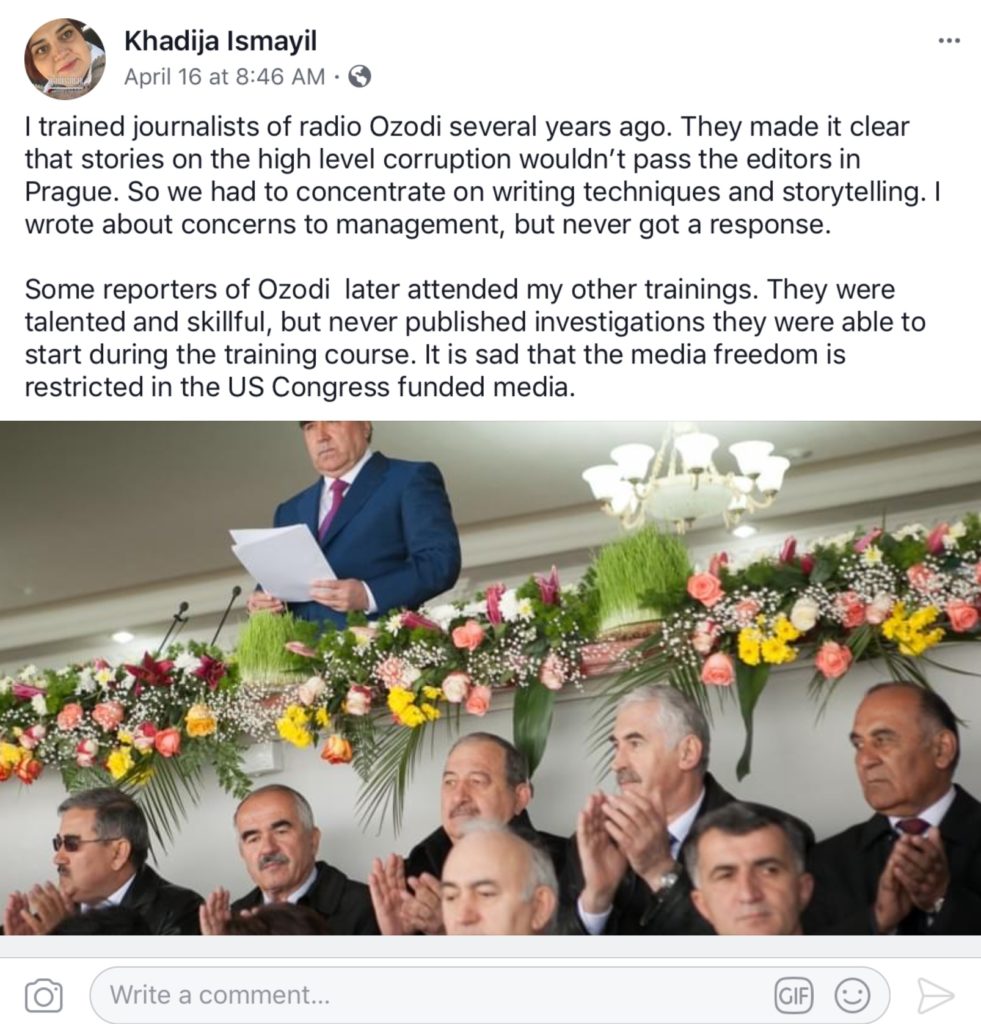BBG – USAGM Watch Commentary
U.S. taxpayer-funded Voice of America (VOA) in the federal U.S. Agency for Global Media (USAGM) has produced a report about award-winning Azerbaijani journalist Khadija Ismayilova which amounted to spreading disinformation about the circumstances of her employment with VOA and another USAGM entity, Radio Free Europe / Radio Liberty (RFE/RL).
In a report issued to mark the World Press Freedom Day, Voice of America failed to disclose that Ismayilova had resigned from both VOA and RFE/RL in protest against censorship and poor management at both of these media organizations managed by USAGM with U.S. taxpayers’ dollars.
Omitting crucial material facts and presenting half-truths in Voice of America reports is worst than lying. It is highly irresponsible for a U.S. government organization to produce disinformation and misinformation. It is something that Russia’s multimedia channel RT and Iran state media do all the time in their propaganda outreach because it works better for them than using plain lies although they also resort to outright lying in the hope that it will create confusion.
It is especially glaring when U.S. tax-funded VOA produces a report with half-truths ostensibly to mark the World Press Freedom Day.
International audiences and Americans, who increasingly are exposed to disinformation online, deserve not be be misinformed by their own government at their own expense through the Voice of America. The VOA Charter, which is U.S. law, says that VOA news must be “accurate, balanced and comprehensive.”
The VOA reporter may not have been lying herself in her report which otherwise accurately presented attacks on free press in Azerbaijan. It is possible that she may have not known all the pertinent facts about Ms. Ismayilova’s past employment with VOA and RFE/RL, but there is no excuse for a journalist of not seeking and discovering such information within their own journalistic institution.
While part of the report had merit, the overall impact was highly deceptive because it implied that organizations such as VOA and RFE/RL are not only opposed to censorship but are themselves exposing and combating censorship in all instances. In fact, both VOA and RFE/RL practice internal censorship and self-censorship and—as many independent critics have pointed out—in some cases help to spread anti-freedom and anti-free press propaganda from authoritarian regimes. It is also true that many VOA and RFE/RL journalists do not practice censorship and some risk their lives and do their job extremely well despite bad management and poor leadership. They also include those like Khadija Ismayilova who have quit in protest rather than compromise their journalistic integrity in USAGM’s mismanaged and poorly-led media entities.
The question is why a VOA reporter would not know these facts or conduct due diligence research to produce a fully comprehensive and fully truthful report instead of one based on half-truths about Ms. Ismayilova?
While the VOA reporter did get right the facts about the lack of press freedom in Azerbaijan, information about Ms. Ismayilova’s severe criticism of VOA and RFE/RL, glaringly missing in the report, can be also easily found online and should have been presented. Without it, the report was incomplete, partially misleading and partially deceptive.
USAGM CEO John F. Lansing was made aware some time ago of Ms. Ismayilova’s low opinion of VOA’s and RFE/RL’s management, as was VOA Director Amanda Bennett.
The question for these senior leaders is whether they had seen this VOA report and, if they had seen it, why have they done nothing to have it corrected immediately with additional critical information.
If they had not seen the VOA report, the question is why not? Constant journalistic failures by VOA and RFE/RL have gone unnoticed by these two officials.
The VOA report about Khadija Ismayilova has been online for two days. Certainly no other VOA editor willing to correct disinformation has seen it or was willing to do anything about it.
Someone at VOA, including Mr. Lansing, Ms. Bennett and her deputy Sandy Sugawara, should have known all the facts, read all VOA reports posted in connection with the World Press Freedom Day and demanded that the report be amended with relevant additional information about Ms. Ismayilova’s prior employment with VOA and RFE/RL and her reasons for leaving both organizations.
There is no denial that VOA reporters are poorly trained and poorly led under the current management team appointed by and headed by Mr. Lansing and Ms. Bennett since 2015/2016.
What the VOA reporter wrote about Khadija Ismayilova and the assault on free press in Azerbaijan was not at all inaccurate; it just wasn’t the whole truth as far as the current mismanaged state of U.S. international media outreach is concerned
The fact is that that Khadija Ismayilova had quit RFE/RL in protest against censorship and mismanagement, just as she had quit VOA earlier, also in protest against censorship and mismanagement.
The kind of censorship and self-censorship she described and condemned in her Facebook posts is still being practiced everyday at VOA and RFE/RL. Some of it is done to produce an appearance of having a large audience through local rebroadcasting.
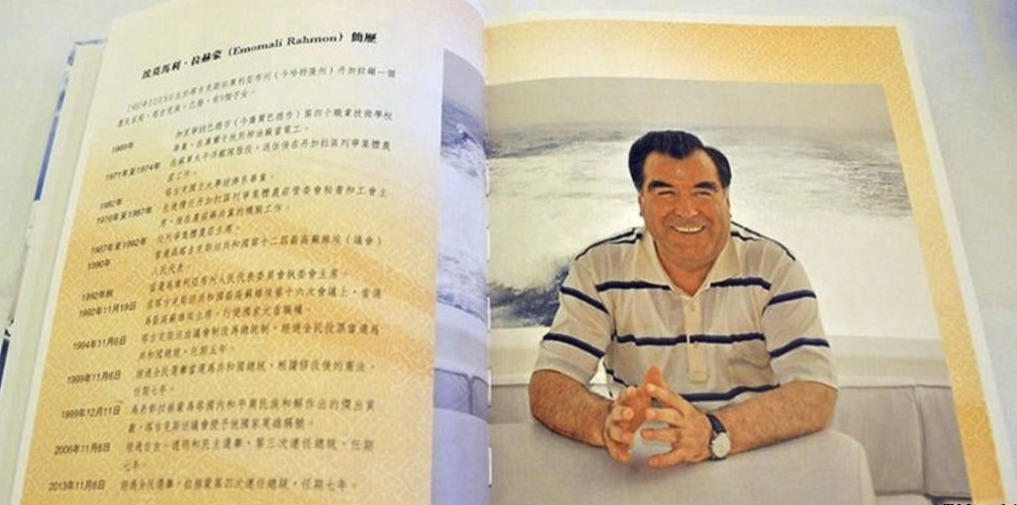

After The Wall Street Journal revealed one of the latest scandals at RFE/RL involving the Tajik Service broadcasting authoritarian propaganda, Khadija Ismayilova wrote in a Facebook post on her page:
KHADIJA ISMAYILOVA: I trained journalists of radio Ozodi [RFE/RL Tajik Service] several years ago. They made it clear that stories on the high level corruption wouldn’t pass the editors in Prague. So we had to concentrate on writing techniques and storytelling. I wrote about concerns to management, but never got a response.
Some reporters of Ozodi later attended my other trainings. They were talented and skillful, but never published investigations they were able to start during the training course. It is sad that the media freedom is restricted in the US Congress funded media.
BBG – USAGM Watch has been warning against it for several years but little was done until The New York Times, former Rep. Royce, and The Wall Street Journal got involved in investigative reporting and in some cases used information from BBG – USAGM Watch.
Another former RFE/RL journalist, award-winning film documentarian Shahida Tulaganova, who also resigned from the organization in protest against the senior management, commented:
SHAHIDA TULAGANOVA: They should really investigate the whole organization. Top management was aware and shut their eyes.
Two mid-level RFE/RL managers retired recently while being praised by senior managers who have kept their positions. Senior executives at USAGM and VOA have not been replaced for several years.
None of this information has made it into the VOA report about Ms. Ismayilova.
Mismanagement has gotten worse and not much has changed in the last several years under Mr. Lansing’s and Ms. Bennett’s tenure.
The recent VOA reporting on Venezuela was just as bad as what VOA was doing before when faced with propaganda from dictatorial and authoritarian regimes.

Recent VOA reports on terrorist attacks on civilians in Israel were particularly one-sided in favor of Hamas propaganda. Last year VOA posted online several raw footage videos showing nothing but burning of U.S. and Israeli flags.
Much of USAGM has been infected with ideological bias and partisanship. Self-censorship is still applied at VOA and RFE/RL, the two outlets we follow most closely.
The VOA report about Khadija Ismayilova was incomplete and therefore at least partially deceptive.
Shame on USAGM and VOA leaders for hiding the organization’s problems from their employees, failing to monitor program output, protecting failed managers, and deceiving both foreign and increasingly American audiences. A fully truthful report about the Voice of America and Radio Free Europe / Radio Liberty written for the World Press Freedom Day should have included the criticism of the agency’s management and programs which appeared in Khadija Ismayilova’s Facebook posts and recent reports by The New York Times, The Wall Street Journal, Columbia Journalism Review and the office of Ed Royce, former Chairman of the House Foreign Affairs Committee.
What Went Wrong with USAGM?
• In recent reporting from Venezuela, the Voice of America highlighted the propaganda language of the Maduro regime and Russia’s state media that tried to present a popular uprising and a limited defection of troops from the Maduro regime as a coup against a legitimate government.
• The American Foreign Policy Council (AFPC) found in an independent study conducted in 2017 that the Voice of America Persian Service and Radio Farda managed by another BBG/USAGM media entity, Radio Free Europe / Radio Liberty (RFE/RL), “on the whole, perpetuated to audiences the appearance of pro-regime propaganda, rather than objective reporting, on the part of both the VOA and Farda.”
• A follow-up AFPC study in 2019 concluded that “Even with the reforms carried out to date, the USAGM’s Persian-language outreach remains far too opaque and unaccountable.”
• A respected former USAGM analyst, Kim Elliott, Ph.D., claims that the agency manipulated audience research to produce false audience data.
• Former Chairman of the House Foreign Affairs Committee Ed Royce revealed in December 2018 that both the Voice of America and Radio Free Europe / Radio Liberty targeted Americans with illegal Facebook ads.
• The Wall Street Journal reported that RFE/RL has been accused by the U.S. State Department of disseminating autocratic propaganda in broadcasts to Central Asia.
• Award-winning Azerbaijani investigative journalist Khadija Ismayilova resigned from both VOA and RFE/RL in protest against censorship and poor management at both of these media organizations managed by USAGM with U.S. taxpayers’ dollars. Ismayilova, a former political prisoner in Azerbaijan because of her reporting, published on Facebook a blistering criticism of RFE/RL management, accusing them of lack of courage, “crisis of career stagnation“ and inability to communicate with their own journalists.
• Chinese Americans have been giving money to defend the suspended VOA Mandarin Service journalists who protested against the senior management’s decision to cut short already announced live three-hour interview with Chinese whistleblower Guo Wengui who promised to reveal corruption within the Chinese Communist Party and Chinese spying activities in the United States. At least one VOA journalist who protested against the shortening of the interview has been fired. In 2017 Chinese Americans staged protests in front of the Voice of America building in Washington, DC during which they performed a mock funeral to show that VOA has lost respect and credibility among the Chinese who defend human rights. VOA director denies that pressure from China influenced her decisions which she claims were driven by her desire to maintain high journalistic standards.
• Human rights activists have asked for a U.S. government investigation of any potential personal conflicts of interests of VOA and BBG and USAGM officials who may have significant business interests in China.
• During the 2016 U.S. presidential election campaign, the some VOA foreign language services translated and posted campaign videos with slurs against Donald Trump. In one complete election campaign video in English and one foreign language produced and posted on an official VOA Facebook page with a VOA logo and without any rebuttal, Donald Trump was called by a Hollywood actor “punk,” “dog,” “pig,” “con,” “buls**t artist,” “mutt,” “idiot,” “fool,” “bozo,” and “blatantly stupid.” The VOA video was later removed. VOA ignores conservative Americans such as Candace Owens or James Woods while giving a platform for monologues by American Communist Angela Davis and Hollywood actor Robert De Niro. The VOA Charter, U.S. law which requires balance in VOA programs, is being ignored.
• USAGM CEO John F. Lansing and VOA Director Amanda Bennett had been warned about some these problems but ignored most of the outside critics until mainstream U.S. media started to report on the scandals. John Lansing reportedly told one critic offering private warnings a year ago about mismanagement within the agency to stop contacting him.
• Following the public disclosure of some of the scandals, Secretary of State Mike Pompeo has called for a leadership change at the USAGM. He made his remarks about U.S. international media outreach in his congressional testimony on March 27, 2019
“And I would urge to get a CEO of that organization in place so that the BBG will have the right leadership so they can do the traditional mission – perhaps in a different information environment than we did back in the Cold War, but can perform its function in a way that is important and noble, and reflects the enormous resources that are – that American taxpayers have put towards that,”Secretary Pompeo told members of Congress.
“I’m very concerned about it,” Secretary Pompeo added.
• Film documentarian and former U.S. Information Agency (USIA) official Michael Pack who is President Trump’s nominee to be the next USAGM CEO is still awaiting his confirmation by the U.S. Senate.
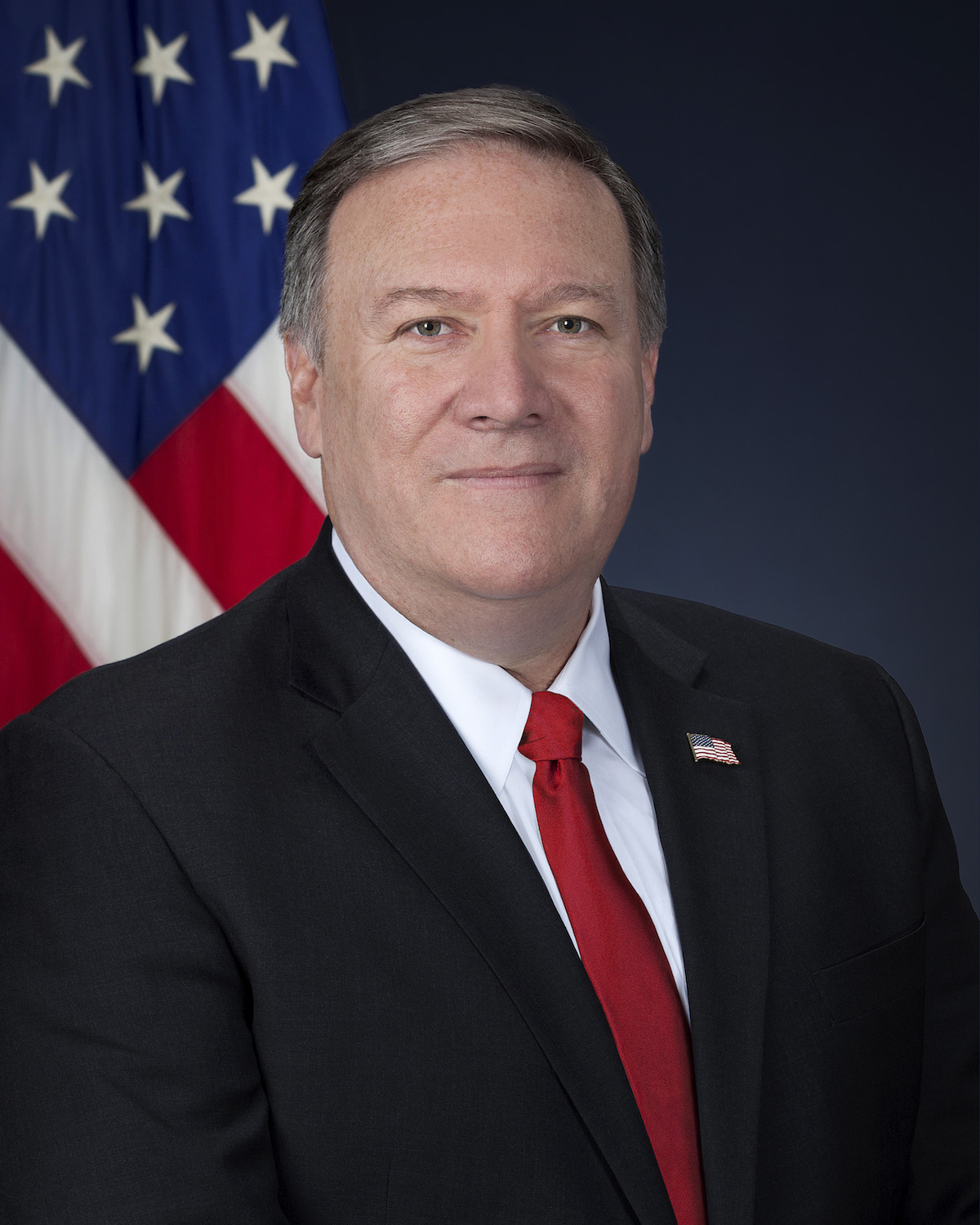
###
VOICE OF AMERICA
Azerbaijan Journalist: Freed from Prison But Not Free to Travel
5/4/19, 12:56
Azerbaijan is a small country, yet it makes a large footprint on the world stage in two areas: oil, of which it has much, and media freedom, of which it has little.
Azerbaijan’s oil wealth gives the nation’s president, Ilham Aliyev, an unusual amount of power on the world stage. World leaders such as Germany and the United States have protested the state of media freedom in Azerbaijan, but they also strive to keep good relations with the Caucasus nation on the shore of the Caspian Sea. Germany, in particular, has been discussing importing oil from Azerbaijan in an effort to reduce its dependence on Russian resources.
Khadija Ismayilova can tell you about media freedom in Azerbaijan from firsthand experience.
The 42-year-old journalist rose to international fame when she was jailed in 2015 for tax evasion and abuse of power. Since being freed after the Supreme Court amended her sentence, she remains on probation, which means she can’t leave the country.
That has prevented her from accepting a job in Lithuania and an award in Sweden, and visiting her mother before she died in a hospital in Ankara, Turkey. Her assets have been frozen by the government to pay the taxes it says she owes.
FILE – Azerbaijan President Ilham Aliyev casts his ballot at a polling station during presidential elections in Baku, Azerbaijan, April 11, 2018.FILE – Azerbaijan President Ilham Aliyev casts his ballot at a polling station during presidential elections in Baku, Azerbaijan, April 11, 2018.
Ismayilova says she has been subjected to government harassment because of the subject matter she covers: Her corruption investigations have exposed far-reaching illegal financial dealings in the Aliyev family.
Yet Ismayilova continues to investigate corruption through an international organization known as the Organized Crime and Corruption Reporting Project. It is an investigative reporting platform that involves a number of nonprofit entities and major news organizations worldwide.
She also compiles records on political arrests and jailings in Azerbaijan — a practice that involves not just journalists but also political activists and human rights advocates. Lawyers, too, are in danger of retaliation from the government. Ismayilova says many lawyers have been disbarred because they defended people against the accusations of the government.
Convictions
Ismayilova has worked for Voice of America, and for Radio Free Europe/Radio Liberty, which closed its Baku bureau in 2014. That’s where the tax evasion charges began.
“Right now my legal problem is that the government announced I have to pay the tax on behalf of Radio Free Europe. It’s absurd,” she says. “Radio Free Europe is nonprofit and should not pay any taxes. But the government demands it.”
RFE has participated in her defense, but she says its response has been too slow and bureaucratic to do her any good. And tax evasion is not the only roadblock to her work.
“Another conviction that I have is illegal entrepreneurship. The government says that because I don’t have international accreditation in Azerbaijan’s foreign ministry, all the money I earn from foreign media is illegal.” She says she even has been fighting to obtain the honorarium from a UNESCO award she won in 2016.
Her work today involves teaching young journalists to do investigative work. But she does not teach in a traditional setting.
“I’m not allowed in classrooms,” she says, because universities must be licensed by the government. She works with nongovernmental organizations to find young journalists interested in investigative work, and then trains them in small groups in private settings.
FILE – Journalists attend a rally Tbilisi, Georgia, May 31, 2017, to support Azerbaijani journalist Afgan Mukhtarli, who was abducted in Tbilisi on May 29 and then detained in the Azerbaijan capital, Baku. He remains in prison.FILE – Journalists attend a rally Tbilisi, Georgia, May 31, 2017, to support Azerbaijani journalist Afgan Mukhtarli, who was abducted in Tbilisi on May 29 and then detained in the Azerbaijan capital, Baku. He remains in prison.
Restrictive situation
Human Rights Watch says “the space for independent activism, critical journalism and opposition political activity in Azerbaijan has been virtually extinguished.” RSF ranks Azerbaijan 166th out of 183 countries in its 2019 World Press Freedom Index.
Today, she says, the country has more than a dozen journalists who are banned from leaving the country. There also are five journalists in prison.
When asked what would be a marker of change in her country of 10 million, Ismayilova’s answer is instant.
“Independent judiciary. When the judge will be able to say no to the political regime when he’s being ordered to rule against [a defendant] for political reasons. That will be a solution for many things.”
Still, Ismayilova says she wouldn’t want to move elsewhere.
“I don’t want to leave the country for good,” she says. “I love my country. But … when you know that you are trapped here, they make you feel that the country is not just motherland, it’s also a prison.”
###
And the other side of the story from BBG – USAGM Watch.
BBG – USAGM WATCH
Renowned newswoman Khadija Ismayilova blasts RFE/RL bosses after quitting
January 25, 2018
BBG Watch Commentary
After quitting in frustration her freelancer position with U.S. tax-funded Radio Free Europe / Radio Liberty (RFE/RL), award-winning investigative journalist Khadija Ismailova (alternative spelling Khadija Ismayil), who while still working for RFE/RL was at one time a political prisoner in Azerbaijan because of her reporting, has published on Facebook a blistering criticism of RFE/RL management, accusing them of lack of courage, “crisis of career stagnation“ and inability to communicate with their own journalists. In her post, Khadija Ismayilova was defending journalists working for RFE/RL Georgian Service who are in conflict with some of the senior managers after they pressured them to affiliate with a partisan television station in Georgia, a move which the service has so far successfully resisted but is afraid that it may lose the fight.
SEE: Management’s push threatens credibility of RFE/RL Georgian programs, BBG Watch, January 22, 2018.
“Stand strong my dear Georgian colleagues, don’t compromise journalism,” Khadija Ismailova wrote in her Facebook post.
In 2015 while still in prison in Azerbaijan, Khadija Ismayilova was awarded PEN American Center’s 2015 Barbara Goldsmith Freedom To Write Award, given annually to “an imprisoned writer persecuted for exercising her right to free expression.”
She was also named the 2016 recipient of the UNESCO/Guillermo Cano World Press Freedom Prize while being praised for her investigative journalism work and defended by CNN’s Christiane Amanpour and numerous other famous journalists and human rights activists. RFE/RL management also had worked on getting her released from prison, as did officials of its parent federal agency, the Broadcasting Board of Governors (BBG) and the U.S. State Department. She was released from prison in Azerbaijan in May 2016 and resumed her freelance work for RFE/RL before quitting recently.
In November 2016, Ismayilova was included as one of the inspirational and influential women of 2016 in the BBC’s 100 Women.
In her January 24, 2018 Facebook post in defense of RFE/RL Georgian Service journalists, Khadija Ismailova wrote that she had “left RFE/RL recently, when I felt it is difficult for me and my colleagues to make senior management (most of whom are in a crisis of career stagnation) to listen to its journalists.”
In her Facebook post, Khadija Ismailova recalled that she had experienced similar lapses of journalistic integrity on the part of management at the Voice of America, which is another U.S. taxpayer-funded media outlet for foreign audiences. Both are managed by the Broadcasting Board of Governors.
Khadija Ismailova wrote:
“I remember the time when Voice of America was trying to keep its affiliation with AzTv – state Tv channel [in Azerbaijan]. I used to work in DC headquarter [BBG and VOA are in the same DC building] back then. The chief of service censored interview of assistant deputy secretary where he was talking about importance of freedom of assembly just because AzTV wouldn’t like that. Well, this ended up with me leaving the job.”
In her Facebook post, Khadija Ismailova defended not only RFE/RL Georgian Service journalists but all journalists working for the organization whose managers she accuses of failure of leadership. “Radio Azadliq [vernacular name for Radio Liberty] was the best thing America has been doing for Azerbaijani people and still is.”
Referring to RFE/RL’s management, Khadija Ismailova wrote: “They rarely chose fighting for right to tell truth if journalists in the spot do not insist. We insisted, they agreed.” In this case, she was describing the RFE/RL Azeri Service standing up to the management.
Telling RFE/RL Georgian Service journalists not to compromise their journalism, Khadija Ismailova wrote:
The Broadcasting Board of Governors, the Voice of America, as well as Radio Farda broadcasting to Iran, which is part of RFE/RL, are also being strongly criticized by Iranian anti-regime protestors and independent Iranian journalists in Iran and abroad for inadequate coverage of recent Iranian protests and having what these critics say is a pro-Iranian regime bias in favor of so-called “reformists” among the mullahs. But Broadcasting Board of Governors Chairman Kenneth Weinstein denies that is the case and says that the BBG-managed programs help Iranian protesters.
Weinstein has defended the BBG and its beleaguered Obama-era appointee John Lansing in a letter to the Editor of The Wall Street Journal which published an editorial highly critical of the BBG.
BBG BOARD CHAIR KENNETH WEINSTEIN: “As board chairman of the Broadcasting Board of Governors (BBG), I can proudly say that the agency is a recognized global pioneer in creating secure platforms for those suffering under repressive regimes around the world. … CEO John Lansing has dramatically grown our digital efforts and broadened the number of tools and vendors available to increase and improve BBG’s anticensorship efforts.”
The Wall Street Journal called the BBG “slow and backward.”
Echoing sentiments expressed by Khadija Ismailova, two well-known Iranian human rights activists have published an op-ed in The Hill, in which they called for reforming the Voice of America Persian Service from its “deplorable state.” Mariam Memarsadeghi and Akbar Atri wrote in an op-ed in The Hill that “Voice of America Persian service needs to be “resuscitated.”
MARIAM MEMARSADEGHI & AKBAR ATRI – THE HILL OP-ED: Voice of America Persian service should be resuscitated from its deplorable state. During the Obama administration, the network lost the large and loyal audience it had because popular, politically sharp programming was canceled and replaced with watered-down messaging to accompany appeasement and rapprochement with the Iranian regime. The outlet is poorly managed, with low morale among staff. If the Iranian people are to make a transition to democracy, they will need daily news and analysis from VOA that is robust and encouraging.
In responding to private criticism from another veteran journalist, John Lansing said that the person who had spent more than three decades in journalism was not in fact a legitimate journalist. Under Lansing’s watch, both RFE/RL’s and VOA’s senior managers appear to be at war with some of their best journalists, including those who had been political prisoners. Award-winning RFE/RL Radio Liberty Russian Service investigative journalist Anastasia Kirilenko was pushed out by RFE/RL management in 2015. She wrote later that RFE/RL management gave no support to their investigative reporters.
VOA’s senior management led by VOA director Amanda Bennett is trying to fire three Mandarin Service broadcasters who resisted the management’s decision to shorten a live interview with Chinese whistleblower businessman Guo Wengui. When the interview was cut short on the orders of senior VOA executives despite protests by Mandarin Service broadcasters, it led to VOA losing much of its credibility in China. VOA Mandarin Service journalists are being defended by some of top U.S. scholars on China. They sent a letter to BBG chairman Ken Weinstein and BBG CEO John Lansing in defense of the VOA Mandarin Service broadcasters.
There has been no response yet from John Lansing or RFE/RL President Thomas Kent and his deputy Nenad Pejic to criticism in Khadija Ismailova’s Facebook post.
“I am not authorized to comment on internal staff matters at RFE/RL. Out of respect for our journalists, it is the company policy not to comment,” spokesperson Joanna Levison told Eurasianet in an emailed response.
Watch this 2016 VOA video in which BBG CEO John Lansing defends Khadija Ismailova and other BBG journalists who were then imprisoned or persecuted by foreign governments for their work.
John F. Lansing on World Press Freedom Day from Broadcasting Board of Governors on Vimeo.
